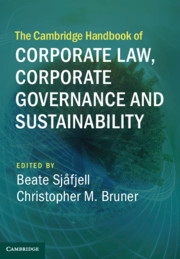Book contents
- Reviews
- The Cambridge Handbook of Corporate Law, Corporate Governance and Sustainability
- The Cambridge Handbook of Corporate Law, Corporate Governance and Sustainability
- Copyright page
- Dedication
- Contents
- Contributors
- Forewords
- Preface
- Introduction
- Part I Global Business and Fragmented Regulation
- 2 Trade, Investment and Corporate Sustainability
- 3 Extraterritorial Attempts at Addressing Challenges to Corporate Sustainability
- 4 Defragmenting Transnational Business Responsibility
- 5 Sustainability and the Move from Corporate Governance to Governance through Contract
- Part II Corporate Law, Financial Markets and Sustainability
- Part III Corporate Law, Corporate Governance and Sustainability: Case Studies
- Part IV Potential Drivers for Change
- Conclusion
- Index
4 - Defragmenting Transnational Business Responsibility
Principles and Process
from Part I - Global Business and Fragmented Regulation
Published online by Cambridge University Press: 25 November 2019
- Reviews
- The Cambridge Handbook of Corporate Law, Corporate Governance and Sustainability
- The Cambridge Handbook of Corporate Law, Corporate Governance and Sustainability
- Copyright page
- Dedication
- Contents
- Contributors
- Forewords
- Preface
- Introduction
- Part I Global Business and Fragmented Regulation
- 2 Trade, Investment and Corporate Sustainability
- 3 Extraterritorial Attempts at Addressing Challenges to Corporate Sustainability
- 4 Defragmenting Transnational Business Responsibility
- 5 Sustainability and the Move from Corporate Governance to Governance through Contract
- Part II Corporate Law, Financial Markets and Sustainability
- Part III Corporate Law, Corporate Governance and Sustainability: Case Studies
- Part IV Potential Drivers for Change
- Conclusion
- Index
Summary
This chapter analyses access to remedies and the efficacy of enforcement mechanisms for corporate sustainability norms at domestic and international levels. It argues that meaningful discussion of remedies and their enforcement must centre on affected communities rather than corporations. Achieving full compliance with sustainability norms already poses enormous challenges, and jurisdictional fragmentation is recognised as a particularly formidable obstacle in the context of developing effective, enforceable remedies. In analysing the barriers faced, a taxonomy using two dimensions – hard law versus soft law, and victim-driven versus external-actor-driven – is presented. Principles for community-centred remedies and enforcement are proposed. They include legal empowerment of affected communities and procedures grounded in international standards. Innovatively, these procedures and remedies are envisioned as forward-looking as well as remedial, and flexible but underpinned by strong incentives for business participation. Effective community-centred remedies are also envisaged as holistic and collaborative, rather than splitting victims into atomised groups.
- Type
- Chapter
- Information
- Publisher: Cambridge University PressPrint publication year: 2019



